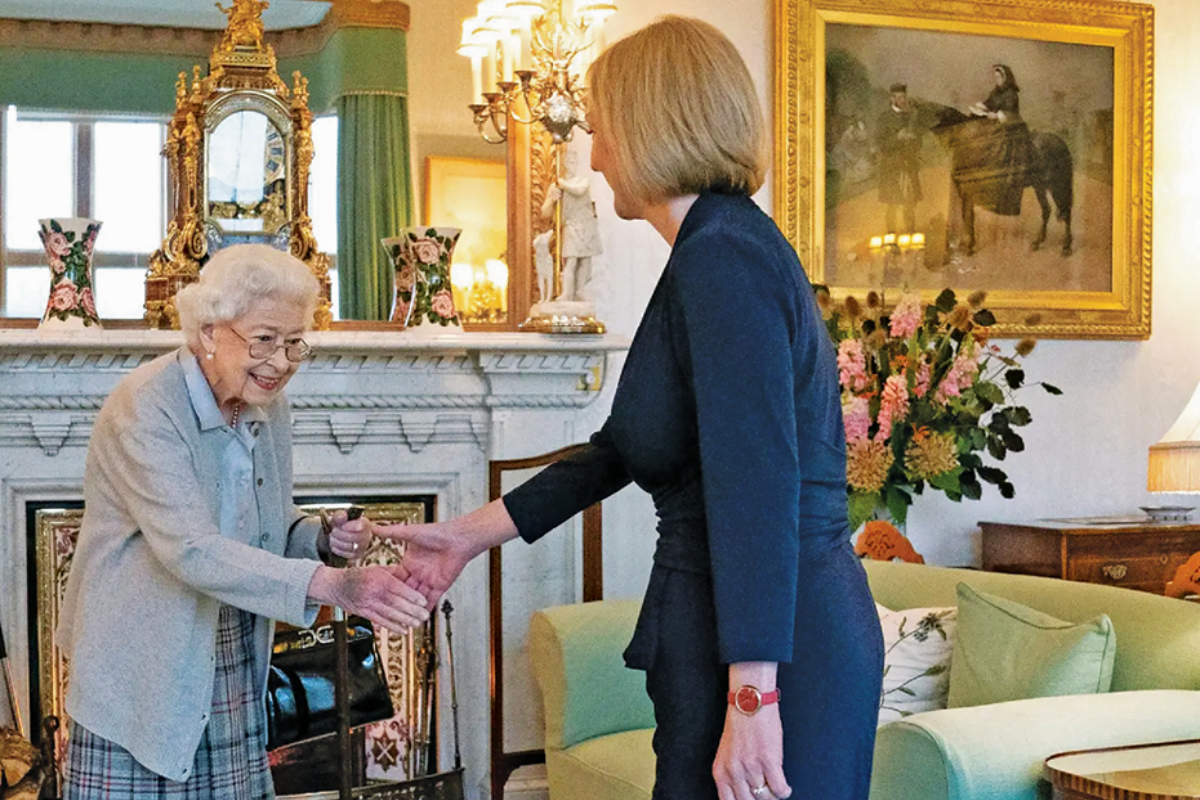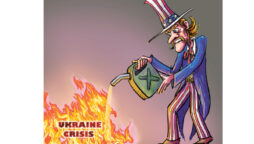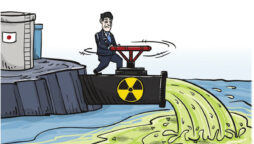
Britain’s 17 prime ministers, from the second term of Winston Churchill to Boris Johnson, were sworn in at the Buckingham Palace after the ceremonial inauguration of Queen Elizabeth II. Earlier, last Monday’s Marry Elizabeth Truss defeated their rival Rishi Sunak of Indian origin by taking 81,326 votes.
Newly-elected Prime Minister Liz Truss has served as the minister in the cabinet of three former prime ministers: David Cameron, Theresa May and Boris Johnson. In her predecessor Boris Johnson’s cabinet, she was holding the responsibilities as the foreign secretary of the United Kingdom.
Liz Truss was born in 1975, 23 years after the coronation of Queen Elizabeth, when the Queen ascended the throne. Winston Churchill of the Conservative Party was the prime minister and when the current Prime Minister Truss was born, the British prime minister was Harold Wilson of the Labour Party.
It is a coincidence that the Queen’s coronation took place during the second term of Churchill’s premiership and Liz Truss was born during the second term of Harold Wilson’s premiership and that Queen Elizabeth’s only daughter, Princess Anne, was married two years before his birth.
Liz Truss had made some promises before her election and some similar promises were made by her rival in his party, Sunak.
Liz Truss promised voters they would roll back the recent increases in the national insurance. She also promised that she would not impose any new taxes and scrap the corporation tax plan, which was planned to increase from 19 per cent to 25 per cent in 2023.
The British citizens have also been promised no increase in corporate tax. She also promised that she would bring some changes in taxes that would make it easier for the people to stay at home to take care of their children and elders.
The new premier also promised to create an environment that would result in new innovations and new business opportunities.
Former finance minister Sunak had also shown good dreams to the British people and the voters of his party. He promised that if he came to power, the tax rate would be reduced to control inflation. He also promised that the income tax will be reduced by one per cent from April 1, 2024 and another 3 per cent will be done after the new parliament comes into existence.
Another important promise was that the independent bodies would work on the salary fixation, revision of wages, allowances and salaries in the government sectors.
He had asked for the corporate tax to be increased from 19 per cent to 25 per cent in April 2023, while Liz Truss had promised to abolish this tax.
Sunak had promised to keep the UK’s defence budget intact. He also said that we should consider the current minimum level of spending of 2 per cent of GDP as the bottom line, not the top-line.
The victory of Truss was considered certain but Sunak also got a lot of votes. The election cannot be called unilateral. Sunak fought well against Truss and got 60,366 votes.
In the UK, in the event of the failure of the prime minister or the loss of support of his party in the House, the new party leader and the new prime minister are elected by all the ordinary members of the prime minister’s party.
A new prime ministerial candidate must be a member of the House of Commons but his voters are all party members. This time, all the members and workers of the Conservative Party voted in favour of the new candidate. Thus, the real power is not with the individuals but with the party.
After the election of Truss, the people of Great Britain will see what direction the new government takes to resolve the country’s problems. This year saw the worst drought in the history in Europe. All previous records for temperature rise were broken. After the Russia-Ukraine conflict, Europe is facing a serious energy crisis.
In Europe, the problems of economic depression are increasing. Due to the increasing tax rate, the problems of degradation of lifestyles have arisen in Europe. Like other continents, during the last two years, the Covid-19 has also changed the way of life.
Although the United Kingdom has separated from the European Union, its problems and conditions are not isolated from the overall problems and conditions of Europe. Due to the war in Ukraine, an energy crisis has arisen in Great Britain, like other European countries, and this crisis has directly affected the lives of the citizens. Electricity and gas bills have created serious problems for the British citizens.
Truss could not, at the time of writing, explain how they would cope with the rising energy prices and sharp increases in the electricity and gas bills.
Moreover, inflation in the UK is also skyrocketing. The impact of prices on workers in Britain has also increased the risks of trade union conflict. And all this situation has increased the pressure on the healthcare system.
Now, it is to be seen what policies Prime Minister Truss creates regarding these immediate problems and how these policies can be implemented.
In this context, we also have to take into account that the Ukraine conflict, environmental problems, inflation and unemployment threats have caused waves of anxiety in the industrial and commercial centers of the UK.
Strikes by workers in ports, railways and industrial centres are reviving memories of the period when the labour movements were at their peak in the 19th and 20th centuries and the specter of communism hovered over Europe. A recession is now emerging, as a result of which old movements and old ideals will be re-established as they adapt to the objectivity of the new realities.
Electricity bills for the British households have risen by 80 per cent. Prime Minister Truss says that she will not introduce gas and electricity rationing system in winter, instead she will focus on increasing the energy supply. Besides, sources in the British government are saying that if the rationing of electricity and gas is not done, then in 2023, we may face several days of blackouts. It is obvious that if there is a disruption in the gas supply, then there will definitely be a decrease in the production of electricity.
Thus, the newly-elected prime minister has rejected the idea of implementing new taxes. However, she has indicated the implementation of taxes on oil and gas companies. Because this year, these companies have earned significant profits. Similarly, the value of the tax cuts that Prime Minister Truss has indicated is worth 38 billion pounds, economic experts say that the value of these cuts will reach 50 billion pounds.
The economists are predicting that if the prime minister refuses to implement taxes, then she will be left with two options, firstly, she will get loans or else she will cut spending. They also believe that Leicester’s actions will increase inflation and the Bank of England will have to increase the interest rate significantly.
The Labour Party has taken the position that we are not in favour of continuing the process of imposing the burden of prices and taxes on the working people to meet the energy needs of the big energy companies. The Labour Party says that the people are going through a national economic emergency, while the ruling Conservative Party is passing the burden of oil and gas companies’ profits onto the ordinary citizens.
The Labour Party has expressed its commitment that we will immediately stop the increase in the energy prices when we come to power. Our party will tax the increasing unaccounted profits of oil and gas. Labour is promising to bring inflation down to 4 per cent. The party says that we will not burden domestic consumers and businesses. It claimed that only this party can save people from the hardships of rising bills.
Another plan that Leicester has to deal with the oil and gas crisis is to drill for oil in the North Sea. Premier Truss policy advisers believe she is considering a proposal to issue 130 new drilling licences for oil exploration. Even if these licences are issued, immediate results will not be obtained. According to an estimate, it will take 20 to 30 years to find new oil and gas deposits in the proposed areas.
Besides, environmental campaigners argue that the search for new oil and gas reserves will exacerbate the climate crisis.
Truss have emerged with renewed determination to meet the new challenges. Now, it is to be seen what new role his predecessor former prime minister Boris Johnson plays in politics. It seems that they will have a dual role either to go ahead and support the new prime minister to ease his problems or to sit on the back benches of the House of Commons and hatch a new kind of conspiracy to defeat the Truss government.
Catch all the The Globe News, Breaking News Event and Latest News Updates on The BOL News
Download The BOL News App to get the Daily News Update & Live News.











 Read the complete story text.
Read the complete story text. Listen to audio of the story.
Listen to audio of the story.